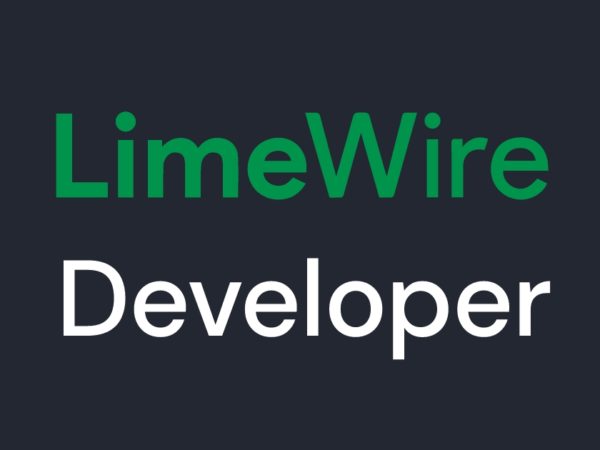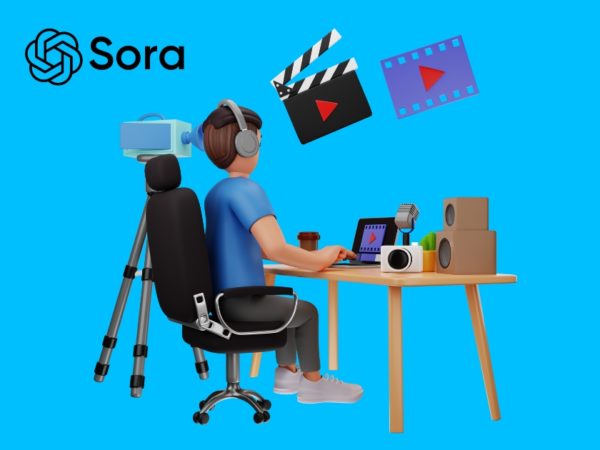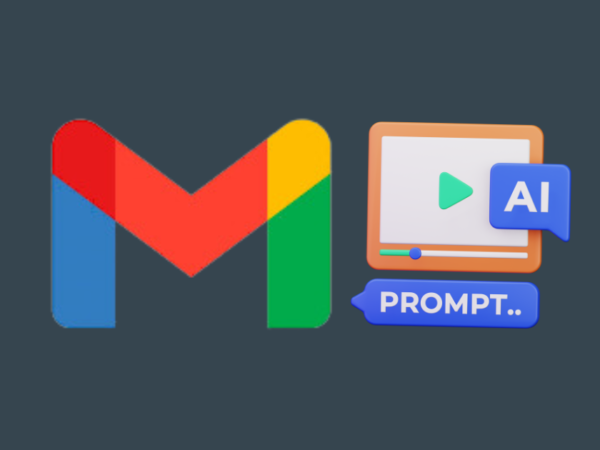<img alt="AI Tools That Will Help Improve Your Mental Health" data- data-src="https://kirelos.com/wp-content/uploads/2023/09/echo/AI-Tools-That-Will-Help-Improve-Your-Mental-Health.jpg/w=800" data- decoding="async" height="420" src="data:image/svg xml,” width=”800″>
One-fit-all mental therapy exercises and video courses aren’t effective for everyone, and not everyone can access a personal therapist. For many, AI tools for mental health can be a more accessible solution.
If you have talked to a chatbot like ChatGPT, you can see they are really good at holding a conversation. There are many AI tools that use the same technology to have a conversation specifically to solve mental problems like anxiety, depression, stress, PTSD, etc.
Whether you are going through a mental treatment or just need to vent after a stressful day, the tools I am listing in this post will help ease your mental health.
Here is a quick summary of the best AI tools For mental health I’ll be discussing below.
Tool
Notable Features
Link
Youper
CBT-based chatbot for decreasing stress
Breathhh
Timely breathing exercises, mood tracking
Replika
Adaptive AI companion app for personalized conversations
Mindsera
AI-supported journaling with automatic comments
GentleGossip
Browser-based tool with 7 AI personalities
Wysa
Offers various AI bots for overcoming life hurdles
Ai’s Role in Improving Mental Health
Mental health issues are on a constant rise, with over 20% of adolescents having some kind of mental health condition. World events like the recent pandemic and the current inflation also contribute to an increase in mental health issues.
AI plays an important role in fighting mental health issues by not only providing advice and comfort but also making treatment easily and widely available. Below are some ways AI makes mental health treatment easier:
Stigma Surrounding Mental Health
The stigma around mental health problems can prevent patients from getting the much-needed treatment. AI offers private and accessible support to people who may be hesitant to seek traditional treatment and may even encourage them to get proper treatment.
Personalized Help
Unlike mental treatment courses and advice, an AI offers personalized treatment of mental health problems according to your symptoms, problems, and living conditions.
Ease of Accessibility
Most AI solutions are either free or cheap and can be accessed from anywhere over the internet. Unlike a personal therapist, an AI mental health tool can be accessed by people who can’t reach or afford a personal therapist.
Early intervention
Since AI tools are more easily accessible, they can identify potential mental health problems before they escalate.
24/7 Support
You can have access to AI support 24/7 compared to a therapist. This not only makes the treatment effective but also helps in dire conditions such as panic attacks.
AI Complements Ongoing Treatment
AI tools can greatly complement the current treatment of the therapist or medical professional. It can monitor the condition, help journaling, ease treatment with alternatives, offer assistance in the absence of the therapist, recommend additional resources, and the other benefits I have mentioned above that personal therapists can’t provide.
Now, let’s explore some best AI tools For mental health.
Youper
Using Cognitive Behavioral Therapy (CBT), Youper helps you decrease stress and anxiety and improve your mood. It’s a chatbot that tries to understand your current mental condition by asking a series of questions and then talking to you to encourage positive behavior.
<img alt="YouTube video" data-pin-nopin="true" data-src="https://kirelos.com/wp-content/uploads/2023/09/echo/maxresdefault.jpg651673ff03184.jpg" height="720" nopin="nopin" src="data:image/svg xml,” width=”1280″>
It will create a custom schedule to check in on you and ask you how things are going. You can talk to it about your day and how you are feeling, and it will reply back with advice that ensures you take a positive approach.
Since it’s based on CBT, the whole purpose of the app is to turn negative thoughts and behaviors into positive ones. It will correct your approach to matters in hand and advice on how to tackle everything positively. Overall, this will help decrease stress, anxiety, and depression.
When you have answered sufficient check-ins, it will give insight into your overall mental state and improvements over time. You can set up and test the app for free, but for actual conversations and check-ins, you need to upgrade to the pro plan.
Breathhh
Breathhh specifically helps with work-related stress and anxiety by helping you squeeze in breathing exercises at the right time using AI. It tracks your activity, whether you are on your phone or the PC, and then recommends breathing breaks at the time when you need it most.
<img alt="YouTube video" data-pin-nopin="true" data-src="https://kirelos.com/wp-content/uploads/2023/09/echo/maxresdefault.jpg651673ff154e0.jpg" height="720" nopin="nopin" src="data:image/svg xml,” width=”1280″>
The tool helps you with breathing using instructions and visual aids, and a session typically lasts for 2 and a half minutes. It will also ask you to rate your current mood and how you are feeling. You can see these entries later to track your mood over time.
Other than relaxing, it also has a bunch of other productivity tools that can help track your activity and help you focus. You can block distracting websites, learn warm-up exercises, play white noise, and get insights on behavior over time.
The app comes with a 7-day free trial (credit card required) and costs $5/month for the yearly plan.
Replika
Replika is the perfect AI companion to listen to you and provide support. It’s an adaptive AI companion app that learns from your interactions with it to keep conversations catered to your needs.
During the setup, you need to create an animated avatar for your AI and tell it your interests that it will remember while conversing with you. You can also separately tell it facts about you in natural language, and it will remember them.
The animated avatar is fully interactable, similar to a game, and you can command it to go around and interact with things. While talking, it will not only answer your questions but also try to start a new conversation itself.
Anything you talk about, it will remember it and possibly recount later, depending on context. The AI personality also changes over time as you talk about your preferences.
The free version lets you talk to the AI and interact with it. Most of the advanced features are only available in the premium version, including the ability to select the relationship with AI, share images, video call the AI, voice chat, and more.
Get it on iOS | Android | Oculus
Mindsera
Writing down your thoughts and emotions is a great way to relieve stress and be at ease. Mindsera takes this to the next level by providing AI-supported journaling in your browser. It gives you free space to write anything you want, and it will automatically comment on it to further provoke thoughts.
Mostly, it will ask questions that further explore your feelings or solutions if you have written about a problem. You can ask it to change the question and even continue writing to get an updated question. It also keeps track of how long you have been writing and your current and longest streaks.
Some other journaling features include creating AI art from journals, voice input/AI transcription, journal summary in bullet points, journal/thought analysis, and personality assessment.
Other than journaling, it also has a nice mentor feature that talks to you using the personality of famous people, like Steve Jobs, Carl Jung, Elon Musk, etc. It could be useful if you prefer interacting in the tone of your favorite personality.
The basic journaling and AI comments are completely free; for other advanced features, you will have to upgrade to their Genius plan.
GentleGossip
If you just want a listening ear to talk your heart out, things couldn’t get simpler than GentleGossip. It’s a simple browser-based tool that has 7 different AIs to listen to you and provide comforting advice.
Each AI has its own personality and specialization in dealing with specific mental health problems. I’ll recommend you ask each AI what they are specialized in to choose the right AI for your needs. For example, the AI James Foster specializes in dealing with PTSD and trauma, and Tonya helps with grief and loss.
In my experience, each AI was very positive in tone and tried to agree with me. Even when I acted impolite in my emotions, they first agreed and then tried to slowly change my behavior by offering alternative solutions. They also ask questions on their own to continue a conversation.
The tool is completely free to use, but you need to create an account first to use the tool. It doesn’t record your history even when signed in, which is a bit of a bummer if you prefer seeing your conversations later.
Wysa
Wysa offers different types of AI bots to help you overcome specific hurdles in life, including mental health issues. By default, it asks for what you need help with, and the AI uses your selection to offer help accordingly. Interestingly, it does most of the questioning, and prewritten answers make it easier to continue the chat.
<img alt="YouTube video" data-pin-nopin="true" data-src="https://kirelos.com/wp-content/uploads/2023/09/echo/maxresdefault.jpg651673ff97906.jpg" height="720" nopin="nopin" src="data:image/svg xml,” width=”1280″>
I personally really liked how it used photos and emojis to complement the conversation and how it kept asking me how I was feeling. It will automatically check on you every day and ask you how your day is going. All of your conversations are kept in a journal that the app will automatically sort, and you can view them later.
The self-care section has hundreds of exercises using AI to enhance positive behaviors. There are exercises to build confidence, be mindful, beat stress, manage anxiety, manage anger, overcome grief, increase productivity, and many more.
More importantly, Wysa’s paid subscription lets you hire a real coach who will have a one-on-one session with you every week to help you overcome mental issues. Basically, you get a weekly human advisor and a 24/7 AI buddy in one app.
The free version is enough to talk to the default AI bot and perform one exercise in each category. The paid version lets you access a human coach and open all exercises.
Bonus
Another interesting AI companion is BobbyChat. Like others in this list, it’s a simple AI therapy bot that uses CBT to ease different mental health issues. What makes it interesting is that it comes as a WhatsApp chatbot. When signing up, you will be contacted via WhatsApp, and then you can have a conversation with it over WhatsApp any time you want.
Final Thoughts 🧠
I was pleasantly surprised by GentleGossip; it’s such a simple tool but very effective and well-made. Although, for versatility, Youper or Replika is much better. Apart from these, I’ll also recommend you to have a chat with ChatGPT or a similar chatbot. With the right prompts, you can easily use it for help with mental health. Even most of the above tools are based on GPT API.



